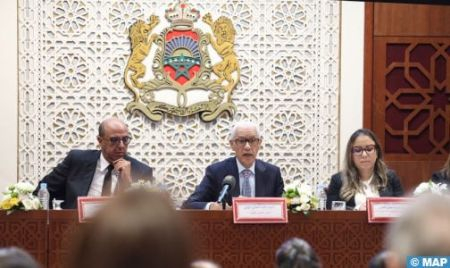Lower House Speaker Deems Guaranteeing Women’s Rights & Increasing Their Presence in Decision-Making Positions, Foundations of HM the King’s 25-Year Reign
Ensuring equality and equity, guaranteeing women’s rights and increasing their presence within representative and executive decision-making positions are some of the foundations of the 25-year of His Majesty King Mohammed VI’s reign, Speaker of the House of Representatives Rachid Talbi Alami said here on Friday. Speaking at the opening of the first annual Parliamentary Forum on Equality and Parity, Talbi Alami stressed that the Sovereign has been and remains keen to ensure that the protection of women’s rights and the preservation of their dignity are at the center of the reforms conducted by the Kingdom over a quarter of a century. On this occasion, the Lower House Speaker expressed to His Majesty the King his profound gratitude and heartfelt thanks “for graciously bestowing His High Patronage upon this forum, thus reflecting His unwavering solicitude to promoting the rights of women and the family in general, and to ensuring equity in all its dimensions”. In this context, Talbi Alami reviewed a number of reforms conducted by Morocco to empower women’s rights, including the adoption of the Family Code in 2004, stressing that the High Royal Directives had a decisive role in ensuring fair legislation for women, children and the whole family, as well as the reform of the Citizenship Code, which enabled Moroccan mothers to pass on their nationality to their children. Other achievements include the use of positive discrimination to boost women’s representation in parliament and local institutions, the Kingdom’s accession to several international charters and instruments linked to women’s rights, the adoption of the law combatting violence against women, the integration of women’s economic and social empowerment into national laws and public policies, and the adoption of a gender-sensitive budgeting, he detailed. The inscription of the rights of women and the family in their various dimensions in the Constitution, as well as the explicit quotation of non-discrimination, was a defining and decisive milestone in the reform process, the Speaker of the House of Representatives stated. Talbi Alami also emphasized that “what makes the Moroccan reform model unique, in this area as in other fields, is that it emerges within a context of consensus, consultation, and engagement and that it is built on valuation and accumulation, which ensures its efficiency, sustainability, and richness”, noting that these elements make this model “open to further development and amelioration by way of interacting with national and international instruments”. In this vein, the Lower House Speaker highlighted “His Majesty the King’s keenness to launching a national dialogue and consultations with a view to reforming the Family Code, twenty years after its adoption”. To this end, he recalled, His Majesty the King had entrusted an authority composed of constitutional institutions and governmental departments with overseeing this dialogue, conducting broad consultations and holding hearing sessions with various components of society in order to receive their propositions. He deemed that “if there were a title to choose for the Moroccan model of reform and development, it must be that of the constitutionalization and institutionalization of human rights, at the heart of which are women’s rights, while giving them an economic, social and cultural tenor, in addition to their effective institutional implementation”. “If there is one trait that marks this reform process, it is update and modernization”, he said. The Moroccan Parliament assumes a decisive role in conducting these reforms, monitoring their impact and in ensuring their assimilation by society, Talbi Alami noted, underlining in this sense the evaluation of Law 103-13 on combatting violence against women, conducted by the House of Representatives during the last legislative year, among other initiatives in legislation, control and parliamentary diplomacy. Aware of the noble nature of women’s participation in term of rights, equality, parity, equity, empowerment, and participation, the House of Representatives has committed to transform the creation of the Thematic Working Group on Equality and Parity into the subject of a permanent section within its rules of procedure, he stressed. Welcoming the vivacity of the Group in its current and previous formation, Talbi Alami also noted that its propositions and activities contribute to enriching the institutional and public debate on the subjects regarding the theme assigned to it and to elaborating and reflecting on propositions to reinforce equality and parity. It is within this scope that this Forum is conceived as a space for dialogue, bringing together several constitutional institutions, governance bodies and civil society organizations advocating for women’s rights, he explained, noting that the aim is to elaborate avenues to strengthen equality and parity, under the provisions of the Constitution and the requirements of the international instruments ratified by Morocco. Furthermore, Talbi Alami expressed the hope that this event, held under the theme “The Parliament: An Essential Lever for Strengthening Equality and Parity”, would contribute to elaborating ideas likely to generate further propositions aimed at enhancing achievements.

